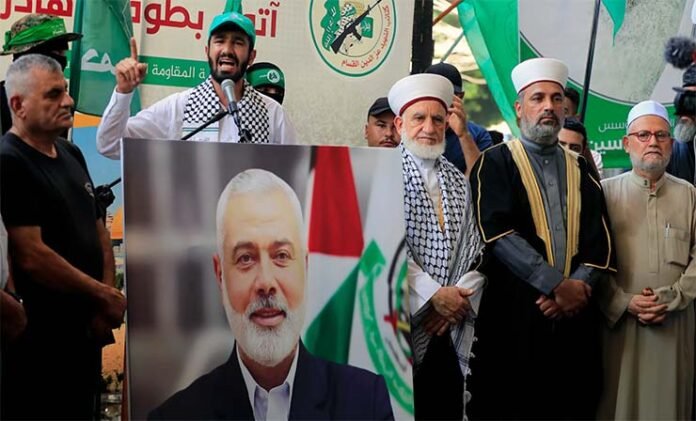On July 31, Ismail Haniyeh, the chief of Hamas or Islamic Resistance Movement – the terrorist group responsible for carrying out the gruesome and egregious October 7, 2023, attack on Southern Israel, was assassinated in an ostensible missile attack that was termed as a ‘projectile’ deep inside Iran. The Hamas chief was on a visit to Iran to engage in talks with the top Iranian military and clerical leadership to decide the next course of action and decide on a potential ceasefire deal with Israel.
The death of one of the most dreaded and well-known, yet infamous personalities in the Middle East is a sign that it only takes a spark to not just widen but also expand the domains of a conflict that has already broken the threshold in terms of devastation, destruction and suffering. But humanitarian concerns often fall prey to geopolitical realities and great power contestation. In this context, it is not just a war between Israel and Hamas, but part of a region-wide proxy war waged by Iran against Israel and its allies, especially the USA, simply because Iran wants to gain strategic leverage in the region, which it perceives to be losing its grip on thanks to improvement in ties between the Jewish nation-state and Sunni Gulf kingdoms in recent times.
It is not just a war between Israel and Hamas, but part of a region-wide proxy war waged by Iran against Israel and its allies, especially the USA, simply because Iran wants to gain strategic leverage in the region
It points to a wider reconfiguration of the political order in the Middle East not only in terms of religious and sectarian polarisation, but mainly from a geopolitical angle. Iran is clearly seeking to send a message to the West: We have diminished in size, but do not underestimate us. The attacks on container ships by the Houthis of Yemen, and projectile attacks deep inside Israel by Hezbollah all signal towards the formidable asymmetric warfare capabilities of the Shiite clerical regime in Persia. These issues merit deeper analysis.
Iran – A Formidable Player
Iran, a country with an ancient civilisation and a demographically young population to boast of, is one of the significant players in the Middle East. It was a part of the Western military and economic circles during the monarchical rule, which lasted until the Islamic Revolution of 1979. Since then, Iran has been a sworn enemy of the USA, calling it ‘Great Satan’ and has been suspicious of European involvement in Iran.
Regarding the Palestinian statehood issue, Iran has committed itself to the right of self-preservation of Palestinians and has vowed to create a Palestinian homeland by eviscerating Israel.
Iran is one of the most skilled players in the proxy war game in the world, its acolytes include Hamas in the Gaza and West Bank, Hezbollah in Lebanon and the Houthi group in Yemen
For decades Iran has been on the sanctions list of the West, but that hasn’t prevented it from building a formidable military force at home and even stronger asymmetric warfare capabilities. Asymmetric warfare takes many forms, proxy war is one of them. It involves using regional militia and insurgent groups to fulfil geopolitical goals while corroding the resistance capabilities of the adversary.
Iran is one of the most skilled players in the proxy war game in the world, its acolytes include Hamas in the Gaza and West Bank, Hezbollah in Lebanon and the Houthi group in Yemen. While they are not strong enough to challenge the conventional military might of Israel, guerilla warfare in urban settings seems to be what they specialise in.
It would be a mistake to regard the ongoing Israel-Hamas war as a conflict that is limited to Gaza, it is not, it is an Iranian attempt to not only reconfigure the Middle Eastern geopolitical order but also to gain what Tilak Devasher calls a ‘strategic depth’ there and beyond that region.
India being the ally of both Israel and Iran is an indirect victim of this proxy war because it finds it difficult to choose between the two countries, both are important partners in terms of economics and geopolitics
Caught in the Crossfire
India being the ally of both Israel and Iran is an indirect victim of this proxy war because it finds it difficult to choose between the two countries, both are important partners in terms of economics and geopolitics. Any attempt by India to choose Israel over Iran would be a diplomatic blunder in that it would put India in a tough spot. With the world’s second-largest Muslim population where the pan-Islamic and solidarity with the Palestinian movement runs deep, India could ill-afford to use the pick-and-choose policy.
The best thing for New Delhi is to not adopt a wait-and-watch policy. It must engage in backdoor diplomacy, especially peace and military ones by dispatching important officials to both the countries, asking them to talk it out, if necessary, with New Delhi playing the role of a mediator.
India’s increasing geopolitical clout and economic heft make it possible for its opinion to carry weight not just in South Asia, but globally. India must go out of the way to try and defuse this crisis, because the longer the war drags on, the more complicated it will become for India to play the diplomatic balancing game.
–The writer is currently working as a Research Associate at Defence Research and Studies (dras.in) and is a columnist. The views expressed are personal and do not necessarily reflect the views of Raksha Anirveda
–The writer is currently working as a Research Associate at Defence Research and Studies (dras.in) and is a columnist. The views expressed are personal and do not necessarily reflect the views of Raksha Anirveda






